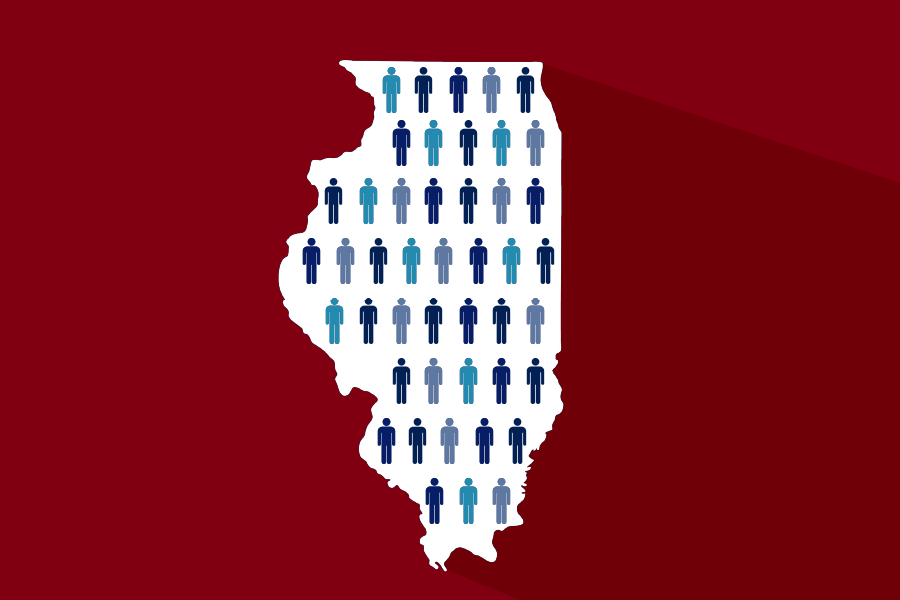Hard to Count: Evanston Census enumerator recruitment intensifies during COVID-19
Graphic by Catherine Buchaniec
With less than a week left until the census response deadline, several census tracts in Evanston risk undercount.
May 20, 2020
Census enumerators, clad in personal protective equipment and taking safety precautions, will knock on doors across America in August. But COVID-19 rattled the Census Bureau’s hiring process, and recruitment efforts are ramping up to compensate.
The Census Bureau’s Chicago Regional Director, Marilyn Sanders, said the region was poised to bring a large pool of enumerators on board when the pandemic shuttered in-person operations. Now, some of those individuals are no longer available, and the Bureau is racing to fill the gap.
Evanston and Chicago’s Rogers Park and Albany Park neighborhoods are three hotspots with a particularly strong need for recruitment, said Anita Banerji, director of Forefront’s Democracy Initiative.
Working to ensure a complete count, enumerators reach out to households that haven’t already self-responded. They also deliver information about the census these groups might not otherwise receive, Banerji said.
“The role of the enumerator is to ensure that that in-person additional touchpoint is occurring,” Banerji said. “In-person contact is invaluable. There is no alternative for it.”
Additionally, enumerators have historically played a large role in reaching hard-to-count populations with low self-response rates, including communities of color and low-income households, said Beth Lynk (Communication ’11), director of the Census Counts campaign at the Leadership Council on Civil and Human Rights.
As of Wednesday night, Evanston’s overall census self-response rate was almost 70 percent. Compared to the city’s average, self-response rates were down nearly 20 percent in parts of Evanston’s west side, where a large proportion of the city’s black population lives.
“Often, it’s easier for community members to feel comfortable opening their doors to a government official or to a census taker (when) that person looks like someone in their community,” Lynk said. “We focus on ensuring that the folks who are applying for those Census Bureau jobs really are representative of that community.”
Lynk said campaigns like Census Counts are keeping a “close eye” on enumerator hiring efforts as the Bureau adjusts to challenges presented by the pandemic. Without a complete count this year, historically undercounted populations will face a shortage in census-directed federal funding and political representation for the next decade.
Sanders said her office recruits workers by census tract. Evanston has 19 different tracts, or subdivisions of a county that share demographic characteristics.
“We’re trying to hire people that look like the community, and we’re trying to hire individuals with languages that represent the community as well,” Sanders said.
The Bureau uses data from past census counts, the Bureau of Labor Statistics and the American Community Survey to understand the composition of each tract before hiring enumerators, Sanders said.
In cases where these numbers fail to capture the full picture of a given region, Sanders said the Bureau turns to “the voices of the community” as a resource. Her office listens to local leaders and partner organizations to learn about changes in tract demographics. The Bureau also instructs these partners to educate constituents about the census process, from promoting participation to recruiting potential enumerators.
One of the Bureau’s community partners is Evanston’s Youth Job Center, a nonprofit matching young people with local employment opportunities.
Prior to the pandemic, YJC brought census recruiters to events at six high schools in the Chicago region, including Evanston Township High School, in addition to other recruitment opportunities.
Eileen Hallstrom, the nonprofit’s director of strategic initiatives, said 60 percent of the teenagers and young adults YJC paired with employment have lost their jobs since COVID-19 hit. Now, YJC employees are meeting with these individuals online and referring them to new positions — like working for the census.
“We serve youth up to age 25, but (enumerator positions) would also serve parents in the communities that we work in,” Hallstrom said. “We want to make sure that everyone in a community where we work knows what good jobs are available. These generally start at $20 an hour, which for many people is a very good wage.”
Potential enumerators must be 18 years or older. In addition to speaking languages other than English, Hallstrom said recruiters are seeking applicants who have internet access and strong customer service skills.
Banerji said it’s crucial for individuals to apply for census enumerator jobs as soon as possible so the Bureau can train them and send them “out the door” smoothly when they start canvassing in August.
“At a time when there is high unemployment, this could be a chance to make a little bit of money,” Banerji said. “And also do a civil service that is so necessary, to set the country up for the next decade ahead. To ensure that we’ve got critical data … so that we can help provide for a better tomorrow.”
Email: maiaspoto2023@u.northwestern.edu
Twitter: @maia_spoto
RELATED STORIES:
— Hard to Count: The fight to prevent a 2020 undercount amid COVID-19
— As census self-response period opens, local organizations evaluate outreach methods during COVID-19



